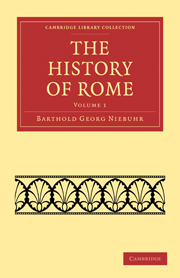Book contents
- Frontmatter
- TO HIS MAJESTY FREDERIC WILLIAM THE THIRD, KING OF PRUSSIA
- PREFACE
- Contents
- INTRODUCTION
- ANCIENT ITALY
- THE PRELIMINARY HISTORY OF ROME
- ROME
- Various Traditions about the Origin of the City
- Romulus and Numa
- Beginning and Nature of the Earliest History
- The Era from the Foundation of the City
- On the Secular Cycle
- The Beginning of Rome and its Earliest Tribes
- The Patrician Houses and the Curies
- The Senate, the Interrexes, and the Kings
- Tullus Hostilius and Ancus
- The Lay of L. Tarquinius Priscus and Servius Tullius
- Examination of the Stories of L. Tarquinius and Servius Tullius
- The Completion of the City of Rome
- The Six Equestrian Centuries
- The Commonalty and the Plebeian Tribes
- The Centuries
- L. Tarquinius the Tyrant and the Banishment of the Tarquins
- Commentary on the Story of the Last Tarquinius
- The Beginning of the Republic and the Treaty with Carthage
- The War with Porsenna
- The Period down to the Death of Tarquinius
- The Dictatorship
- The Commonalty before the Secession, and the Nexi
The Beginning of the Republic and the Treaty with Carthage
Published online by Cambridge University Press: 05 June 2011
- Frontmatter
- TO HIS MAJESTY FREDERIC WILLIAM THE THIRD, KING OF PRUSSIA
- PREFACE
- Contents
- INTRODUCTION
- ANCIENT ITALY
- THE PRELIMINARY HISTORY OF ROME
- ROME
- Various Traditions about the Origin of the City
- Romulus and Numa
- Beginning and Nature of the Earliest History
- The Era from the Foundation of the City
- On the Secular Cycle
- The Beginning of Rome and its Earliest Tribes
- The Patrician Houses and the Curies
- The Senate, the Interrexes, and the Kings
- Tullus Hostilius and Ancus
- The Lay of L. Tarquinius Priscus and Servius Tullius
- Examination of the Stories of L. Tarquinius and Servius Tullius
- The Completion of the City of Rome
- The Six Equestrian Centuries
- The Commonalty and the Plebeian Tribes
- The Centuries
- L. Tarquinius the Tyrant and the Banishment of the Tarquins
- Commentary on the Story of the Last Tarquinius
- The Beginning of the Republic and the Treaty with Carthage
- The War with Porsenna
- The Period down to the Death of Tarquinius
- The Dictatorship
- The Commonalty before the Secession, and the Nexi
Summary
The Tarquinii, from what has been said, may have been glad, even more so than any other citizens, of a change, by which the power, until then enjoyed by a single individual, was placed annually within the reach of every noble member of their house, and was secured to them, without being divested of anything but its priestly dignity. For the kingly power was transferred, with no abridgement but this, to the annual magistrates, who in those times still retained the name of prætors. Hence the accurate Dion Cassius, deviating from all other writers, did not use the name of consuls until after the decemvirate; when, as he conceived, the appellation was changed. I allow myself to imitate the example of Livy and Dionysius in giving this glorious name to the immediate followers of the kings. For which reason I here introduce the remark, that this title is neither to be derived from consulting the senate, nor from giving counsel: for, at the beginning of the republic especially, commanding was far more than either the one or the other the distinguishing attribute of the consulate. Without doubt the name means nothing more than simply collegues: the syllable sul is sound in præsul and exsul, where it signifies one who is: thus consules is tantamount to consentes, the name given to Jupiter's council of gods.
- Type
- Chapter
- Information
- The History of Rome , pp. 456 - 474Publisher: Cambridge University PressPrint publication year: 2010First published in: 1828



